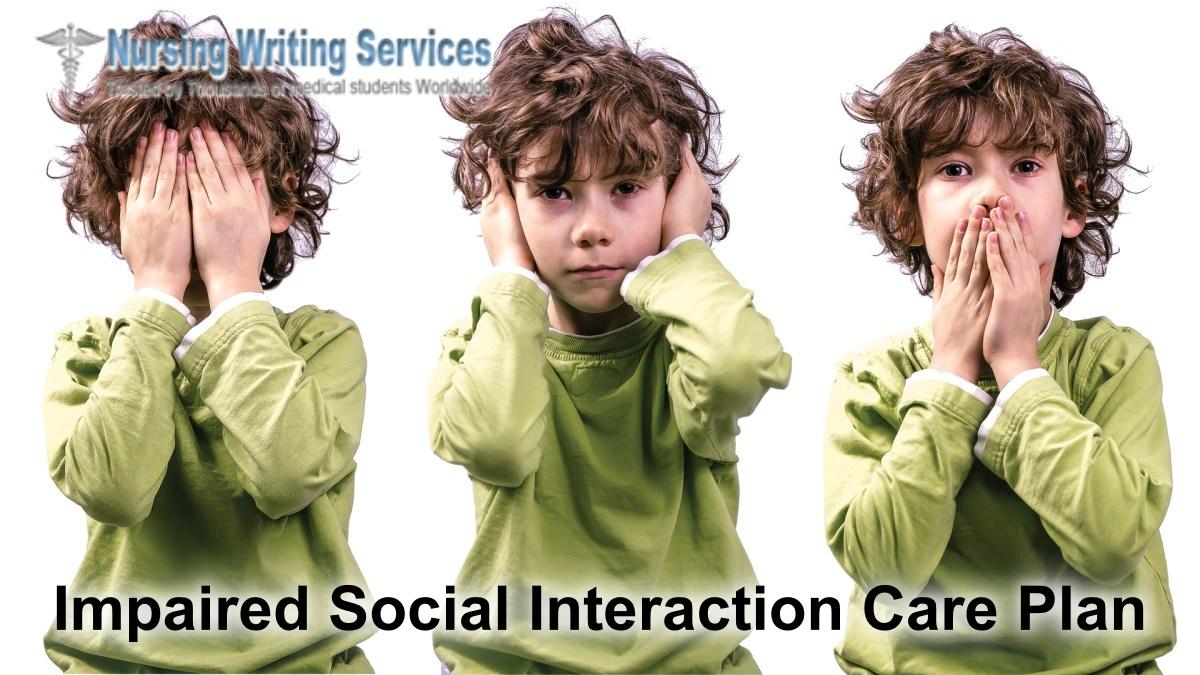
Impaired social interaction is a consistent lack of orientation to a person, place, circumstances or time for a period exceeding 3 to 6 months creating the necessity to form a protective environment. Protecting the patient is a professional judgment based on the application of clinical knowledge that determines the actual or potential experience of a patient. It also requires professional judgment to determine the response by a patient to this impairment and life processes it affects. Impaired Social Interaction Care Plan outiline the various set oction carried out when managing this condition. For the best, reliable and effective Impaired Social Interaction Care Plan, Nursing Writing Services offers you the best Impaired Social Interaction Care Plan Writing Services.
An impaired social interaction care plan helps the nurse to follow the commonly applied interventions and choose the most applicable to a patient. Choosing the intervention from a standard Impaired Social Interaction Care Plan allows fast, efficient understanding of the patient needs, the ways to sort them out and promote patient safety.
Impaired social interaction Diagnosis
A diagnosis is essential in finding out if a patient has impaired social interaction, particular need and the right course of action without going through a long narrative. After suspecting patient to have impaired social interaction, a caregiver should look if a patient has these signs and symptoms to confirm the existence.
- Persistent state of disorientation to the environment
- Extreme confusion
- Inability to follow simple instructions, concentrate or reason
- Memory decline that leads to loss of social function or occupation
- Slow response to questions
A patient with these relating factors could also be having impaired social interaction.
- Depression
- Dementia
- Huntington's disease
Impaired social interaction Care Plan Goals and Outcomes
A nurse should prepare a Impaired Social Interaction Care Plan with a goal to help the patient in achieving these outcomes that contribute to containing impaired social interaction:
- Identify physical changes without taking offence
- Acknowledge and respond to the efforts by other people in establishing communication
- Maintain full extent orientation to the environment
- Take precautions to keep off injurious
- Increased concentration
Impaired Social Interaction Assessment
Nursing assessment is essential to determine the defining factors showing that a patient must be having impaired social interaction. It also helps to define the right interventions to include in the Impaired Social Interaction Care Plan and help the patient to overcome the impairments.
A nurse should make these assessments:
- Coordination and interaction with other people in the social settings
- Hearing or vision deficits
- Knowledge and communication
- Sensory perception
Impaired Social Interaction Interventions and Rationales
A care plan should have nursing interventions based on outcomes of assessment to help the patient in achieving the desired results.
Orient patient to reality
Impaired social interaction causes disorientation of the mental functioning. Orienting a patient to the reality requires the nurse to keep calling the person by name, informing him about the day, date, year and location. Try to keep all items in the same place and ensure that the patient's name or photograph for them to register in the mind.
Observe the patient reaction to treatment
A nurse should give much attention to the client. The patient might be sensitive to the attitude of the people towards him or interventions. Having regular discussions inspires confidence in the caregiver encouraging the patient to share any unpleasant experiences. When talking to a patient, maintain eye contact to foster trust.
Instill coping mechanisms
A nurse can play an essential role in helping the patient to develop coping skills. One of the ways is to encourage the patient to perform activities of daily living (ADL) independently. When the patient gains the ability to complete most of them without assistance, it reduces the feeling of dependence. Another way is to focus on the patient's strengths. A nurse can, for example, praise the patient for completing task increases self-esteem and inspiration to try more in the coming days.
Encourage engagement in physical and social activities.
One of the interventions is to help the patient in conquering the sense of isolation by engaging in social activities with people of various age groups at least once in a week. Exercising also helps to improve the state of mind and allow the patient to have something different from the routine. A long-term intervention includes enrolling the patient in a support group.
For smooth implementation and success of interventions in an impaired social interaction care plan, a nurse should work together with the family of the patient and other healthcare professionals who treat the patient. Inform the family members or other caregivers about the essential reorientation techniques and assistance with self-care.
Impaired Social Interaction Care Plan Writing Services
Writing a perfect Impaired Social Interaction Care Plan can be challenging to understand on how to go about it. Nursing students, and professionals are often restrained by time and inadequate access to resources, Impaired Social Interaction Care Plan Writing Services come in handy to help. Nursing Writing Services has the best writers to handle Impaired Social Interaction Care Plan Writing Services and provide you the best and effective care plan. Our writers are well experienced and skilled in Nursing Care Plans Writing Services and have worked with different groups of nurses and students backed with training in medical and nursing sciences. This makes us stand out as the leading Impaired Social Interaction Care Plan Writing Services provider.
Developing an Effective Care Plan for Impaired Social Interaction
Introduction
Impaired social interaction is a challenging condition that can significantly affect an individual's ability to communicate, interact, and engage with others. This condition can arise due to various factors, such as developmental disorders, mental health issues, or neurological conditions. As healthcare professionals, it is crucial to develop comprehensive care plans that address the specific needs of patients with impaired social interaction. In this article, we will explore the essential components of an effective care plan for individuals facing difficulties in social interaction.
Assessment and Diagnosis
The first step in creating a care plan for impaired social interaction is a thorough assessment and diagnosis. Healthcare providers, including nurses, psychologists, and psychiatrists, must gather comprehensive information about the patient's medical history, social background, and behavioral patterns. Observation and standardized assessments can help in identifying the extent of impairment and the underlying causes.
Goal Setting
Once the assessment is complete, the healthcare team can establish specific and measurable goals for the patient's care plan. The goals should be individualized, focusing on improving the patient's social skills, enhancing communication, and fostering meaningful connections with others. Realistic and achievable objectives will guide the care plan's implementation and evaluation process.
Intervention Strategies
A successful care plan relies on the implementation of effective intervention strategies. These strategies should be evidence-based and tailored to the individual's unique needs. Some common intervention techniques include:
-
Social Skills Training: Conducting structured sessions to teach and reinforce appropriate social behaviors and communication skills. Role-playing and real-life scenarios can be utilized to practice interactions in a safe environment.
-
Group Therapy: Encouraging patients to participate in group therapy sessions can provide opportunities to practice social skills, build self-confidence, and gain insights from peers facing similar challenges.
-
Communication Aids: For patients with communication difficulties, using visual aids, assistive devices, or communication boards can facilitate expression and understanding.
-
Behavioral Therapy: Implementing behavior modification techniques to address specific social challenges and encourage positive behaviors.
-
Family Involvement: Involving family members in the care plan can promote consistency in supporting the patient's social development and integration.
-
Sensory Integration Therapy: For patients with sensory processing issues, this therapy can help regulate sensory responses, improving their ability to engage in social interactions.
Progress Monitoring and Evaluation
Regular monitoring and evaluation are vital components of an impaired social interaction care plan. The healthcare team should assess the patient's progress toward the established goals and make any necessary adjustments to the intervention strategies. Objective measurements and feedback from the patient, family, and caregivers can provide valuable insights into the effectiveness of the care plan.
Collaboration and Multidisciplinary Approach
Caring for individuals with impaired social interaction requires a multidisciplinary approach. Collaboration among healthcare professionals, educators, therapists, and family members is essential to ensure a holistic and well-rounded care plan. Regular team meetings can facilitate information exchange and provide a comprehensive understanding of the patient's progress.
Patient and Family Education
Educating the patient and their family about the condition and the care plan is crucial for its successful implementation. By understanding the challenges and strategies involved, the patient and their support network can actively participate in the care process, leading to more positive outcomes.
Conclusion
Developing an effective care plan for impaired social interaction is a collaborative and dynamic process. It requires a thorough assessment, goal setting, evidence-based interventions, and ongoing evaluation. With the right support and intervention strategies, individuals with impaired social interaction can make significant progress in their ability to communicate, interact, and connect with others, leading to improved overall well-being and quality of life. As healthcare professionals, it is our responsibility to provide compassionate care and help these individuals overcome their challenges to lead fulfilling lives.
- Nursing Care Plans Writing Services
- Nursing Care Plans in APA Writing Help
- Best Nursing Care Plan Writers



